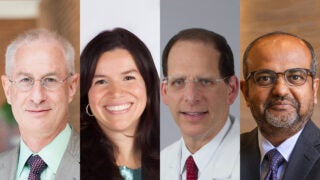New chief of professionalism and ethics wants to instill culture of fairness, integrity
Michael Blanton will oversee a new office dedicated to handling complaints and sensitive investigations across the university
As head of the soon-to-be unveiled Office of Professionalism and Ethics at USC, Michael Blanton will be responsible for managing all complaint monitoring and investigation throughout the university.
The new office will streamline and update the university’s processes for registering and dealing with complaints at all levels on both campuses. By introducing a centralized tracking system, USC administrators can spot trends and respond swiftly when necessary. Blanton, USC’s vice president for professionalism and ethics, expects the office to be formally announced and operational in the next two to three weeks.
The Southern California native earned his law degree at the USC Gould School of Law in 1997 and worked as an attorney before returning to USC in January 2017 as vice president for athletic compliance. He spoke with USC News about his plans to ensure accountability and transparency at all levels of the university.
What are your guiding principles as you take on this critical new role?
I love this university — it’s done wonderful things for me and I always feel an obligation to give back. What I tell those who work for me is that USC has been here long before you and will be here long after you and I are gone. As an employee, you have a duty to the university and not to your friends or any one individual. When problems arise, what I try to do is take a step back before making major decisions to ensure that we are doing the right thing and considering all the relevant interests in the university. And I do feel a deep personal obligation to do what is right. I’m motivated to come to the right outcome with honesty, fairness and integrity.
What is the genesis of this new office?
The goal is to address our organization’s previous gaps regarding how information was siloed in various places around the university. Different departments had bits of information, but no centralized office knew all the facts about certain incidents of misconduct or other issues. This effort grew out of recent crises at USC. The idea is to bring information that comes in from both campuses together in a centralized office to help prevent any issue from slipping through the cracks.
How will that improve accountability?
We want to be consistent in our outcomes. Part of my job is not only to track investigations, but also to ensure that discipline is carried out following an investigation. We don’t want situations where one school or department has the same conduct issue as another, yet they have vastly different punishments or outcomes. Although we won’t involve ourselves in those disciplinary procedures, we will track that process to ensure it happens with consistency and integrity.
You previously oversaw athletic compliance at USC. How has that prepared you to launch this new office?
Athletic compliance does a lot of things. Most of it is education and working with all the teams and departments to make sure we are complying with all the Pac-12 and NCAA rules. However, at times, we do investigations of varying size and degree. That was a great training ground for this new position on a smaller scale. The things we’ve done internally here at athletic compliance are similar to the things that will be done on a larger scale in this new office.
Can you describe your background and previous connections to USC?
I grew up in Thousand Oaks and went to high school there. I did my undergrad at Cal State Long Beach and then went to law school at USC. I was ecstatic to come here — I have always been a big Trojan fan. My dad was a big fan, too. He was happy to see me go to law school here. He unfortunately passed away in 2004. He would have loved to see me working here now. My kids are diehard Trojan fans as well, even before I started at USC. I have a 13-year-old and a 17-year-old, both daughters. My 17-year-old is a senior in high school and would love nothing more than to come here.
Do you have any memories that stand out from your time in college?
I grew up in a middle-class family and my parents helped as much as they possibly could, but I was working full-time as a college student. I took jobs every summer. As an undergrad at Long Beach State, I worked graveyard shifts [in hotel security] and went to class during the day. Grad school is obviously different than undergrad. By the time you’re in law school, you’re just buried in the books. My law school days were spent working very hard, trying to get by on as little in student loans as I could. I had summer internships here and in Chicago, which was nice because it put a little change in my pocket. Then it was back to the grind. But it helped me learn the art of hard work.
Where did you work after finishing up your law degree at USC?
I went to work for a big firm right out of law school. From there, I went to a smaller, boutique firm with about 15 attorneys at the time. We did all manner of civil litigation. One of our clients at that point, around mid-2000, was USC. So I began working as outside counsel for USC. Then we closed up that shop at the end of 2011, and from 2012 until I started here in 2017, I was with Hill, Farrer & Burrill. Throughout all that time, I would say USC was my biggest volume client. I always had matters of all types involving the university, whether I was litigating in court or I was brought in to solve problems before they became lawsuits, which is always ideal. I like to think I provided good results at a good value and that’s why they kept coming back. Thanks to that work, I became familiar with almost every department and how the university worked. That helped a lot when I landed here in 2017.
How were you recruited to oversee the USC Office of Athletic Compliance?
Because I was a regular outside counsel for USC, when [former vice president for athletic compliance] Dave Roberts announced he was retiring, they reached out to me to see if I was interested in interviewing to be his successor. I thought about it overnight, called them back and said yes. I came in for what seemed like six hours of interviews, and about a month after that I was offered the job. My first day of work was on the sidelines at the Rose Bowl when we beat Penn State. I defy anybody out there to have a better first day of work. That was such an epic game, and to be on the sidelines for that experience — where do you go from there? You’ve peaked on day one.
Before coming to USC, you also worked occasionally as a temporary superior court judge. What was that experience like?
I would volunteer about one day a month over a five-year term up in Ventura County and would typically hear small claims cases. The folks I would see in there came from all walks of life. I loved that work. It puts you in a different role — it takes you out of being an advocate like when you are an attorney and forces you to be as objective as possible. You have to use all that experience you’ve gained to read people. In Los Angeles County, I primarily served as a traffic court judge. In an afternoon, you might have over 100 cases you have to get through, so it’s really rock and roll. That experience was also great, and I got to meet and deal with so many different people.
Did that influence your approach to working in compliance and now overseeing this new office at USC?
From my standpoint, you don’t want to draw premature conclusions on any investigation. An investigation is only as good as the objectivity of those who are analyzing or looking into the issues. Like a judge, you have to take in all the relevant evidence and make an objective decision. And you make hundreds of those decisions in the course of an investigation. It dictates who you talk to next, what weight you give to evidence, how you take into consideration credibility issues. All of those should be objective decisions as you move through the process to arrive at the right outcome.
How do you measure success in this new role?
My goal is to help the university be better and continue to be a great place for people to work and go to school. And it’s really about the culture. I think the culture will change once everybody feels more comfortable with the process and knows issues will be acted on and they won’t be retaliated against for coming forward with their concerns. After this new office has been in operation for a year or two and we can take a sample of students, faculty and staff and ask them, “Do you feel more confident about how complaints about misconduct are handled at this university?” and the answer is “Yes,” then I’ll know we’re on the right track. At the end of the day, we’re really aiming to set a national standard for how higher education handles these kinds of issues. We have done this with athletic compliance, and my message for the team is that we should aim for nothing less with this new Office of Professionalism and Ethics.



